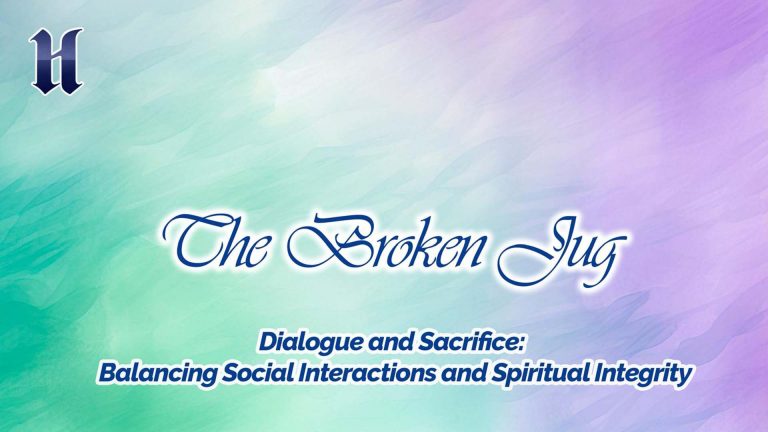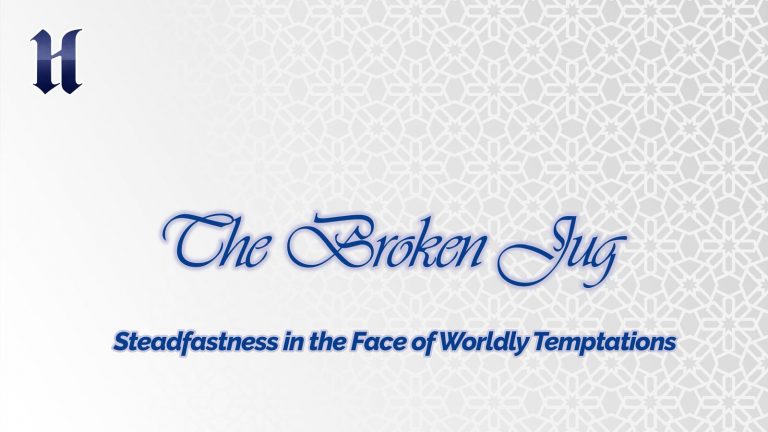Question: How was Ali ibn Abi Talib’s relationship with the other three Caliphs? It has been claimed that he had serious disagreements with them. Would you please explain the truth of this issue?
Answer: In order to make a sound evaluation of the issue, it is first necessary to know the character of Ali ibn Abi Talib and the other three Rightly Guided Caliphs. Any comments made without any knowledge of the true worth of these great figures can give way to different interpretations and, thus, to wrong conclusions. Now let us try to have a better understanding of the Rightly Guided Caliphs in the context of some particular examples from their awe-inspiring lives.
The Crown of the Golden Line of Saints
Our master Ali is one of those who spent the longest time under the training of the Prophet, peace and blessings be upon him. He established an extra aspect of closeness to the Prophet by marrying his blessed daughter Fatima, mentioned in a hadith as, “Fatima is a piece from me. Who makes her sad, makes me sad.”1 The noble Prophet often visited their home and sat with them; he took his grandchildren on his lap and loved them. Therefore, Ali ibn Abi Talib always found the opportunity of breathing the atmosphere of the Prophet. In addition, his blessed grandchildren were born in that fortunate home, and the Prophet’s lineage continued through them. People from the lineage of Hasan are titled as “sharif,” and those of Husayn are titled as “sayyid.” In this respect, our master Ali has a very different position in terms of being the forefather of the greatest saints such as Abu’l Hasan ash-Shazili, Ahmad Rufai, Abdulqadr al-Jilani, and Sheikh an-Naqshband.
There Would Be No Islam If It Were Not for Abu Bakr
The other caliphs also have special virtues of their own. For example, Abu Bakr’s firm stance at some critical points is very important. His being the first man to support the Prophet, his facing up to dangers during their emigration from Mecca, and in many instances his coming between attackers and the Prophet to shield him saying like one of the relatives of the Pharaoh did, “Would you kill a man only because he declares, ‘My Lord is God!’” are all very important instances.2 For this reason Ali said, “If it were not for Abu Bakr, there would be no Islam”3 and was among the foremost who appreciated Abu Bakr. At another instance, Ali expressed Abu Bakr’s greatness with the following words, “A single night of Abu Bakr is worth our lifetime.”
The Insurmountable Wall That Stood between Truth and Falsehood
Umar ibn al-Khattab similarly had his own special virtues. During his Caliphate, he virtually served as a barrier before all factors of hypocrisy and dissent which threatened the unity of Muslims. In addition, the two superpowers of the time, Byzantine and Sassanid empires were defeated and many people accepted Islam. When Iran (Persia) surrendered after the Battle of Qadisiyah, they began to harbor a grudge against Umar ibn al-Khattab. Bediüzzaman refers to this truth in The Gleams by stating that it was not their love for Ali but their grudge against Umar. Ali ibn Abi Talib served as the religious consultant—the title that would be termed as sheikhulislam later on—during the time of these two great caliphs since he knew their worth. That is, these two caliphs mostly consulted him at issues that required a fatwa, or a religious ruling. In particular, Umar ibn al-Khattab asked him many questions and received fatwas from him. The following case narrated in books of hadith is meaningful in terms of showing the relationship between them. Our master Umar said, “I know that you are just a stone. You bring neither benefit nor harm. If I had not seen God’s Messenger kiss you, I would not kiss you.” Ali spoke to him very comfortably, “Had you known the secret of this stone, you would not have spoken this way, O Umar.” On hearing this, Umar responded by saying, “If it were not for Ali, Umar would be lost.”4 As it is seen, they were people who knew each other well and appreciated each another.
If I Had another Daughter, I Would Give Her in Marriage to Him Also
Uthman ibn Affan had a different depth, a different kind of specialty. The Messenger of God gave his daughter in marriage to him, and when she passed, he gave a second daughter as well. In response to those who spoke against it, he stated, “If I had another daughter, I would give her in marriage to him also (after the death of the second one).” Uthman ibn Affan governed the state peacefully at a period where alien thoughts penetrated into the Islamic world; this is a very important fact in terms of understanding his greatness.
Different Depths, Different Qualities
To put it briefly, each of the Caliphs had a particular virtue which makes them better than others in that particular respect. As it is known, when a particular virtue is concerned, one can be superior to another person who is more virtuous in the overall sense. In this respect, it is a proper approach to look at each of them with his own character, position, true worth, and essence, and to believe that each one represents a different quality of the Prophet. It is for this reason that Abu Bakr is titled as “Siddiq” (the truthful one), Umar as “Faruq” (one who separates truth from falsehood), Uthman as “Zinnurayn” (the bearer of two blessed lights), and Ali with such titles as “Khaydar al-Karrar” (the attacking lion),” “the master of saints,” “master of the chivalrous,” and “the Prophet’s son-in-law.” It is impossible for anyone else to reach these Caliphs with respect to the particular qualities that each one possessed. I will not call them transcendent, for it is not quite theologically correct to use this word for people; they have a very exceptional status in terms of the fact that they have unreachable and unsurpassable aspects. For example, they are virtually matchless at governing a society and being a rightly guided caliph. For numerous other reasons that we cannot list here, each of them is worth the entire world. As it is known, when the Prophet named the Ten Companions who received glad tidings of Paradise while in this world, he counted the four Rightly Guided Caliphs as the first four. Accordingly, their worth needs to be considered in terms of their being from the people of Paradise.
Inconsistent and Baseless Slanders
After taking all of these into consideration with a holistic perspective, assuming Ali to be an opponent of Abu Bakr and Umar, claiming the former to be the righteous one whereas the latter two were wrong, is first of all a great insult against Ali himself. It is impossible for a hero of bravery and valor like Ali to obey Abu Bakr and Umar at a matter he considers not to be righteous; he was fearless. As it was seen during the siege of Khaybar, he was so daring that he walked toward death comfortably. According to a compliment ascribed to the Prophet, “There is no youth like Ali; there is no sword like dhulfiqar.”5 Claiming such a person to have bowed before Abu Bakr and Umar in the face of injustice is a disrespect and insult to the spirit of Ali ibn Abi Talib. Therefore, it is necessary to highlight that such claims are actually contradictory in themselves.
Additionally, when we approach the issue by considering the fact that the Prophet kept Abu Bakr, Umar, and Uthman around him throughout his blessed life, it becomes clear that negative approaches about these three people convey an insult to the Prophet at the same time, because it can be concluded from such a claim that the master of the Prophets failed to recognize that—God forbid—they had certain schemes of their own. This is actually a great disrespect against God’s Messenger. However, one of the significant depths of the Prophet’s perspicacity was his knowledge of the people around him and discovery of their abilities. When he looked at a person’s face only once, he instantly knew where that person would serve best and assigned him accordingly, owing to his prophetic perspicacity far beyond genius. Claiming that the noble Prophet—from the first time he received revelation until his passing from this world—was unable to assess his closest companions and failed to have an insightful understanding of their behaviors and characters is a very serious mistake of reasoning. As for what sound thinking and reasoning are required by us concerning this issue, it is valuing the people valued by the Prophet and having due respect for them. Indeed, virtues of the Companions are reported in many different hadiths. And in Hadith collections, there are separate chapters devoted to the Companions’ virtues. The Pride of Humanity drew attention to the unreachable position of the Companions by stating, “My Companions are like stars. Whichever you follow, you find right guidance.”6 One time, he held the hands of Abu Bakr and Umar and said that they would be resurrected in the Hereafter in the same way. At another time, he stated that he had two viziers in the world and two in the heavens; those in the world were Abu Bakr and Umar, and those in heavens were Gabriel and Michael.7 Making negative remarks about such people stems from not knowing the Messenger of God and these Companions well.
Also, in addition to giving them the glad tidings of Paradise, the Prophet not only married daughters of Abu Bakr and Umar, he gave two of his daughters in marriage to Uthman and one to Ali. Thus, he established another special relationship with them. If we look at the issue from the perspective given in Ibn Arabi’s Fusus al-Hikam, marrying someone’s daughter and giving one’s daughter in marriage convey different meanings in terms of understanding the inner meanings of happenings (ta’wil al-ahadith). Since we are ordinary people closed to such spiritual depths, I will not get into these but explain the issue in a plain fashion.
A Small Blemish in the Center Grows to the Periphery
In spite of the Prophet’s recognition of these Companions’ special virtues, diverging views about them appeared. As they did not seem to be great blemishes at the center, it was not apparent at the beginning how great the real the deviation would become. What was once a small blemish in the center grew so huge to reach the periphery. It grew to such a point that as time passed, some went to the extreme of declaring Ali as—God forbid—an unbeliever; others claimed to step forward with love for him, but in doing so they spent their lives with enmity against Abu Bakr and Umar instead. They used the name of Ali as justification for their enmity, and even went so far as to extoll him with attributes that he, the great person whom he was, would have never approved of. Some esoteric sects appeared who took the issue to the degree of even deifying him. Thus, since the early period, such claims about Ali have been behind different misguided currents as in the case of Hassan Sabbah, the Karmatis, Ismailis, and Nusayris, along with so-called Mahdi the saviors that appeared in different parts of the world.
Though it is criticized in terms of the criteria of evaluating hadiths, Bediüzzaman relates a saying of the Prophet that two groups of people will be misguided because of Ali. There came a time, Persians dismissed Abu Bakr and Umar completely, and they displayed an antagonism toward the two to the degree of naming them after the two pre-Islamic idols jibt and taghut, and slandering Aisha, the Mother of Believers.
The Cultural Codes that Feed Grudge and Hatred
Those who hold this divergent view in our time do not voice these ugly things in public, probably by taking into consideration the general condition of the Islamic world, international relations, and present conjuncture. However, if we look at their expressions of grudge and hatred that surface in different events, it is understood that they cannot rid themselves of these negative elements, and that it is very difficult for them to do so because of the cultural environment in which they were raised and the sources they have used. They developed certain methodologies and wrote certain books. Thus, their general belief and opinion developed in this way. For example, if we look at an essential source as Qadi Abdul Jabbar’s Usul al-Khamsa, which contains the essentials of their belief, it will be seen that they made the issue of imamate into one of the five essentials of faith. Accordingly, the imam must definitely come from the lineage of Ali ibn Abi Talib; it is not possible for anybody else to be imam. By considering such secondary issues among essentials of faith, they caused horrible deviations.
Actually, if what matters is loving Ali and being attached to the family of the Prophet, all Muslims can be considered as followers of Ali in this sense. Our books of Sufism and world of literature are a witness to this. When these are carefully studied, it will be seen that they overflow with love for the Prophet’s family. It is not correct to make an emphasis to a secondary aspect of the issue and turn a blind eye to the issues related to the primary essentials. As I previously expressed in different contexts, I grew up with love of Ali in my familial environment. He was a hero to me in my childhood. I pictured a man who could take fifty heads when he drew his sword. Given that I imagined him as such a hero, it is natural for me to have such abundant love for him. Love of Ali pervaded my soul and cortex so much, and let me state that I had great difficulty at maintaining the balance for a long time and putting Ali to the same rank with the other Caliphs.
Keys of Love That Open the Rustiest Locks
As for today, in spite of all of these things in the past, what befalls us to extend a friendly hand to everybody without discriminating between Alawi, Nestorian, Assyrian, etc., doing goodness and thus neutralizing the negativities that can possibly be abused by dark powers of inner and outer origin.
Previously I made the following comment about solving the problems in the Southeast of Turkey: it is necessary to show the magnanimity within the spirit of the people of Anatolia to the Southeasterners once more and make it into a continuous process whose format is constantly renewed. For example, it is possible to hold different activities in the region by making good use of the blessed nights. If you do this by organizing a program at a mosque and bless their nights by piercing the darkness, then you will be doing something important with respect to finding common ground and conquering hearts. Besides, if governors, police chiefs, doctors, and religious teachers—with the condition of all being perspicacious ones—are sent to the region and work for healing the wounds of the society, then all the schemes will be eliminated in time.
It is necessary to come to grips with the problems with the keys of love and affection, which can open any door in the world, with the style of Rumi and the system of Yunus Emre, and a universal magnanimity of conscience. If there is one thing that can root out problems for good, it is sincerely opening your heart to everybody and thereby finding a way into their hearts. While it may be possible to suppress problems by force for a while, it is not possible to show a human problem that has been solved with brutal force. Even if it seems to be ended, it will surface in a different form eventually. It can be said that such examples of sedition have a character of reincarnation; they will keep appearing before humanity until they are completely eliminated. In this respect, brutal force is one of the greatest obstacles to full functioning of reason and sensibility. That is, when you wish to deal with problems by suppressing them, you cannot use your reason efficiently to produce different alternatives. Certainly security forces must exist, but they must be guided by reason, sensibility, perspicacity, and insight, and under the control of the conscience and fairness. I believe that when such an understanding is adopted to address this problem inherited from earlier historical periods, it will begin the journey to a promising solution.
1. Sahih al-Bukhari, Fadailu’l-Ashab, 12
2. Sahih al-Bukhari, Fadail us-Sahaba, 5
3. Al-Daylami, Al-Musnad, 3/358
4. Al-Hakim, Al-Mustadrak, 1/628
5. Ibn Asakir, Tarikh Dimashq, 39/201
6. Aliyyulqari, Al-Asraru’l-Marfu’a, 388
7. Al-Hakim, Al-Mustadrak, 2/290
This text is the translation of “Asr-ı Saadetteki Hâdiseleri Okuma Adına Bir Bakış Açısı.”






